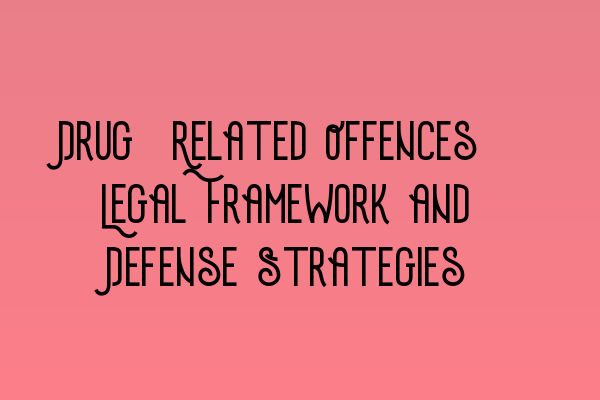Drug-Related Offences: Legal Framework and Defense Strategies
Welcome to the SQE Criminal Law & Practice Law UK blog! Today, we will be delving into the legal framework and defense strategies surrounding drug-related offences. Whether you are an aspiring solicitor, a legal professional, or simply interested in criminal law, this article will provide you with valuable insights into this complex area.
The Legal Framework
Drug-related offences fall under the umbrella of criminal law, specifically in the area of drug legislation. In the UK, drug offenses are primarily governed by the Misuse of Drugs Act 1971. This legislation categorizes drugs into different classes, ranging from Class A to Class C, based on their potential harm and misuse. Each class carries its own set of penalties and sentences.
If you are preparing for the SQE 1 exam, be sure to check out our comprehensive SQE 1 Practice Exam Questions and SQE 1 Practice Mocks FLK1 FLK2 to enhance your understanding of drug-related offences and improve your chances of success.
Defense Strategies
When faced with drug-related charges, a well-planned defense strategy is essential. It is crucial to consult with an experienced criminal defence solicitor who can guide you through the legal process and help build a strong defense. Here are some common defense strategies employed in drug-related cases:
- Lack of possession: Challenging the prosecution’s evidence to prove that you did not possess the drugs in question.
- Unlawful search and seizure: Questioning the legality of how the drugs were obtained, focusing on any potential violations of your rights.
- Impermissible police conduct: Arguing that the police engaged in improper conduct during the investigation or arrest, such as entrapment or coercion.
- Third-party involvement: Demonstrating that someone else had access to the drugs or that you were unaware of their presence.
- Forensic analysis: Questioning the accuracy and reliability of drug analysis techniques or challenging the chain of custody of the evidence.
- Mental health or addiction treatment: Presenting evidence of underlying mental health issues or addiction problems that could mitigate the charges or influence sentencing.
If you are looking to specialize in criminal law and aiming to pass the SQE 2 exam, we highly recommend our comprehensive SQE 2 Preparation Courses designed to equip you with the necessary knowledge and skills to handle complex drug-related cases.
Stay Informed
Stay up-to-date with the latest SRA SQE Exam Dates to ensure you plan your study schedule efficiently. Knowing the exam dates will allow you to focus your preparations and allocate your time effectively. Visit our article on SRA SQE Exam Dates to find out more.
We hope you found this blog post informative and insightful. For more detailed material and comprehensive guidance on all areas of criminal law, be sure to explore our range of SQE 1 Preparation Courses.
Thank you for reading, and we look forward to helping you achieve success in your legal career!
